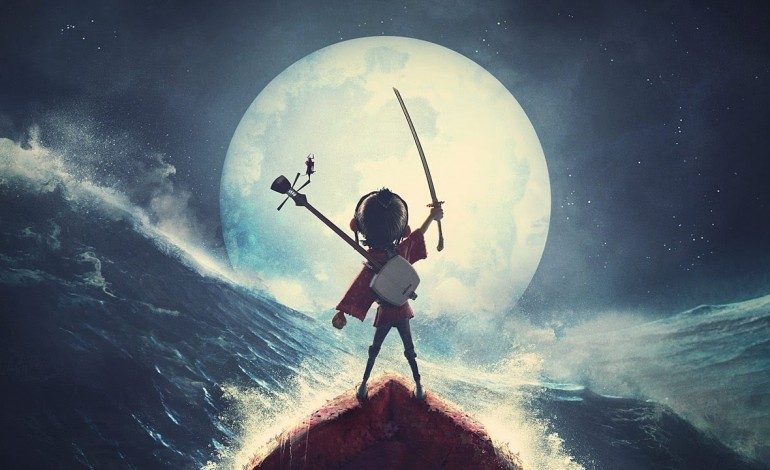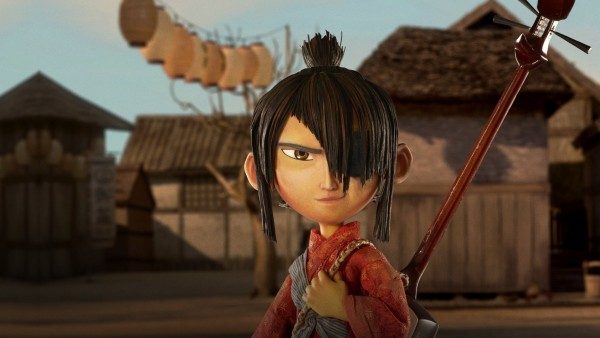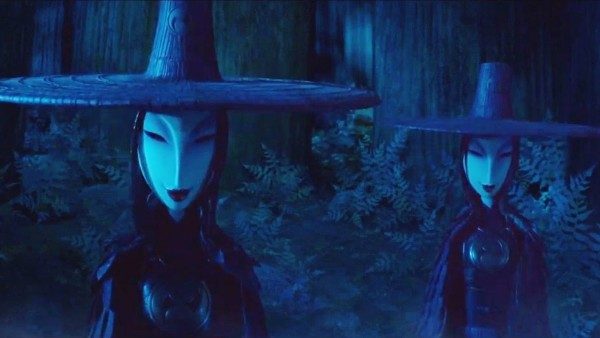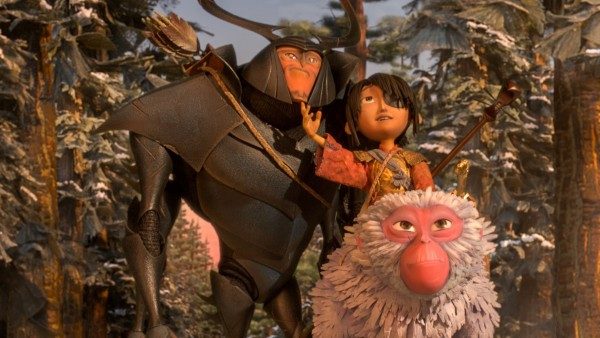

Laika Entertainment’s latest animated children’s movie, Kubo and the Two Strings, follows in the footsteps of the company’s dark repertoire of films like Coraline, ParaNorman and The Boxtrolls. This time around, their haunted family fare (directed by president/CEO Travis Knight) cleverly mixes genres to create a heroic fable-like tale influenced by the unique artistic aspects of Japanese culture. Its innovations in animation and story outshine some of its weaker aspects in character and plot yet ultimately create a deeply heartfelt testament to the idea of the pen being mightier than the sword.
Kubo follows a young one-eyed storyteller/troubadour (Art Parkinson, Game of Thrones) who lives just outside of a Japanese village with his ailing mother. When ancestral spirits (Rooney Mara as The Sisters, Ralph Fiennes as The Moon King) from the mother’s past threaten him, his village, and his family legacy, Kubo goes on a journey through a magical realm to obtain the separated pieces of his deceased father’s armor in order to defeat the maleficent apparitions. On his journey, Kubo is aided by the help of a monkey (Charlize Theron) and a beetle (Matthew McConaughey) who put together the pieces of Kubo’s fractured family heritage and help him to come into his own identity and reach his full heroic potential.
The film begins and ends with the same narrative warning: “If you must blink, do it now. Pay careful attention to everything you see no matter how unusual it may seem. If you look away, even for an instant, then our hero will surely parish.” This sentiment invocates the audience as participants in the heroic journey and grounds the film in its central message, that being the saving power of storytelling. In this sense and others, Kubo does a tremendous job in reimagining heroism for its young audience. Although Kubo is tasked with hunting down the pieces of his father’s armor – traditional symbols of the classic hero – it is Kubo’s ability for storytelling and the use of his shamisen (a guitar-like stringed instrument) that weaponize him against the ancestral vendetta.
Kubo’s shamisen also plays an active role in transitioning the auditory and visual components of storytelling. Knight’s animation comes alive through the playing of Kubo’s strings and introduces a new way of presenting stop-motion. Knight integrates Japanese origami into the surrealist animation style, as Kubo implements the paper-folding art to magically build the worlds of his tale (as Kubo plays his strings, the paper takes on a life of its own). This creates a particularly sweeping visual that makes the film truly majestic and quite unlike any other animation before it when scenes are built and torn down as swiftly as a house of cards. Additionally, the dark tone created by the ghostly fable adds layers of depth to the overall sensory experience.
As the structure and visual of the story create an intriguing fantasy world for the audience, the bulk of the plot unfortunately falls somewhat flat. When Kubo enters the magical realm to locate the armor, he encounters a motherly monkey figure (Theron) and a comically strongman beetle (McConaughey) who help him on his journey. While Theron and McConaughey both do great voiceover work here, adding comedic flare to the film’s darker tone, the plot takes too much time to define their roles and the significance of their animal personas is lost on the wider tale. From there, the interior plot becomes too busy as Knight attempts to cram in elements of different genres, cultures, and interwoven character arcs. By rough means, Knight does manage to eventually connect every element, however, and creates a compelling hero in Kubo. Instead of by the sword, Kubo is truly powered by the strength of his family legacy and the values of his culture – i.e. the passing down of one’s heritage through the telling of stories. Thereby, Kubo figuratively keeps his family alive through his own unique talents.
Verdict: 3 out of 5
Kubo and the Two Strings will be a welcome addition to the animation world and to those craving more from Laika’s shadowy children’s fare. As Knight’s first time directing a feature animation film, he has undoubtedly made his mark on the genre. The film is visually compelling and tells a uniquely satisfying heroic tale despite moments of overcrowding plot. It will not likely stand above the other animated offerings this year (Zootopia, Finding Dory, The Secret Life of Pets), but will in the very least stand out among them.



